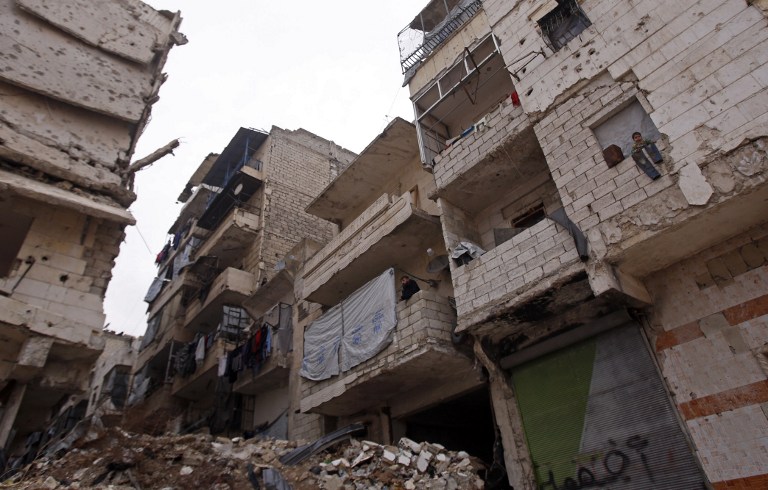
The Syrian government suspended the evacuation of civilians and fighters from the last rebel-held parts of Aleppo on Friday, leaving thousands of people trapped and uncertain of their fate.
/ AFP PHOTO / Youssef KARWASHAN
by Hui Min NEO
Agence France Presse
BERLIN, Germany (AFP) – The fall of Aleppo has unleashed a mixture of outrage and impotence in the West, in which fury at the relentless carnage has mingled with guilt over the failure to stop it.
Even the European public — who marched in the millions over the siege of Sarajevo or against the Iraq War — stayed at home as the Russian-backed Syrian regime smashed the country’s second largest city.
The relentless offensive began mid-November, drawing condemnation from Washington to London to Berlin, but nothing else.
In an emotional appeal on Tuesday, the US envoy to the United Nations, Samantha Power, asked President Bashar al-Assad, and his backers Russia and Iran: “Are you truly incapable of shame?”
But beyond waging a war of words, the West has been unable to halt the onslaught.
Air and ground strikes have killed hundreds of civilians and left hundreds of thousands without homes, food and water.
At a European Union summit on Thursday, a visibly dismayed Chancellor Angela Merkel accused the Syria regime and its Russian and Iranian backers of war crimes, noting that “the attacks were targeted at civilians, at hospitals.”
And on a visit to Berlin earlier this week, French President Francois Hollande too admitted that “we waited too long to get a political plan.”
The Financial Times noted that “having stood by last year as Moscow intervened to save Mr Assad’s tyrannical regime, the West has ceded influence over subsequent events.”
Germany’s Sueddeutsche Zeitung was also scathing, saying that “at best, the EU resembles the well-meaning but limited rescue worker. At worst it is playing the role of the shocked observer.”
‘Desperate for solidarity’
But even beyond the corridors of power, public mobilisation has also been lacklustre over the Syrian conflict that has evolved from anti-Assad protests into a multi-front war that has killed more than 312,000.
The image of Syrian toddler Aylan Kurdi’s lifeless body washed ashore on a Turkish beach brought home the desperation of millions of refugees fleeing from the war-torn country.
Yet that interest has not focused on the root causes of the exodus.
Even in Germany, which has taken in hundreds of thousands of Syrian refugees, protests have not really taken off.
Mohammad Abu Hajar, a Syrian refugee in Germany, voiced both anger and desperation at the public’s apparent indifference.
“Most of our protests here in Berlin are composed of an absolute majority of Syrians. We feel left behind,” he told AFP, after the latest demonstration he organised this week attracted only dozens.
“It is not only me who is angry we are talking millions of people, not only angry but also desperate for any kind of solidarity,” he said.
“Western governments… show so much solidarity with Syrian refugees but nothing against the reasons why they became refugees, an attitude that we cannot understand,” he added.
Merkel herself had said she was shocked to see hundreds of thousands of Germans hitting the streets to demonstrate against free trade deals but virtually no protests against the bloodletting in Syria.
“There is something wrong there,” she said.
Berlin-based swimmer Yusra Mardini, who was a member of Team Refugee at this year’s Olympics Games, agreed with the German leader.
“But if I’m gonna watch every day what’s happening in Syria, I’m going to go and cry every day in my room…The problem is that I can’t do anything about it and that’s making me feel bad,” she said.
It was only in the Bosnian capital where a protest gathered thousands this week.
“We survived Sarajevo, and we know what that is, we can’t remain silent,” said Mujo Agonic of the 43-month siege of the city in the 1990s by Serb forces that claimed 10,000 lives, including that of her eight-year-old daughter.








